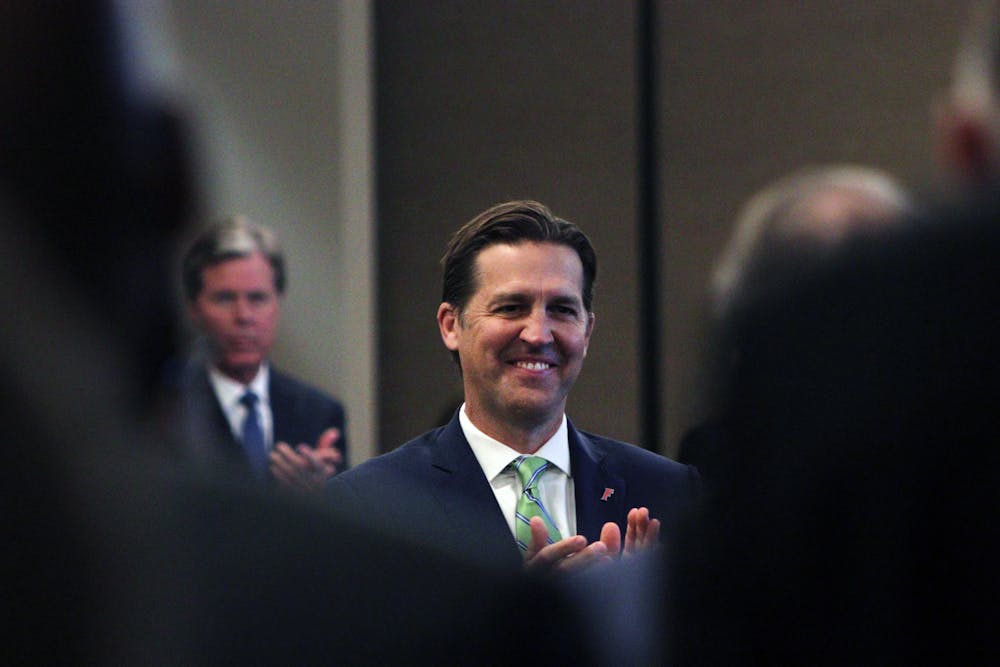The UF Faculty Senate proposed a resolution Oct. 19 to review shared governance processes across the university, which dictate how faculty, staff and students are able to participate in decision and policy making.
The proposed resolution tasks faculty councils across the university to review shared governance processes within their college, unit or department. Additionally, the resolution calls on UF President Ben Sasse to direct academic deans and directors across the university to strengthen shared governance processes.
Sasse made an appearance at the beginning of the meeting to express concerns that shared governance can slow down the university’s ability to make decisions.
“I’m a big believer in shared governance,” he said. “But the purpose of shared governance is to make better decisions, not as an excuse to not make decisions and to just defer them well into the future.”
Initiatives like UF’s Jacksonville graduate campus will require faster decision-making processes, Sasse said.
UF has “a couple hundred million dollars” of public and private money set aside for the Jacksonville campus that “evaporates if we don’t spend it,” Sasse said. “I think there are a number of things we’ve done historically that if you look at the timelines and you try to lay out the way we’ve done things in the past, that won’t be fast enough to deploy resources that we want to deploy in Jacksonville.”
In June, a faculty senate committee produced a report on the status of shared governance at the university. The committee had surveyed and anonymously interviewed faculty across UF’s 16 colleges.
UF Faculty Senate Chair Danaya Wright said Oct. 19 the report showed shared governance is “spotty” in some colleges.
“Different colleges had different issues,” Wright said. “Everybody had room for improvement.”
Some senators openly questioned and satirized Sasse’s views on shared governance after he left the meeting early.
Carolyn Holland, a College of Medicine senator, asked Wright if Sasse’s past comparison of shared governance to “molasses in January in Antarctica” was justified.
“Are there any examples of things that were so bogged down that the world ended?” Holland asked. “Because he makes it sound like the faculty senate is standing in the way of progress for the university, and I don’t have any concrete examples of that where I can say, ‘Oh yeah, I understand where he’s coming from.’”
“I don’t either,” Wright responded. “There’s no question that faculty can get together in a room and spend a very long time talking about things, but at the end of the day my sense of the faculty is that they are incredibly good at coming up with good ideas and input into things.”
Gene Witmer, a College of Liberal Arts senator, said Sasse’s stance was confusing considering his political history. Before coming to UF, Sasse served as a Republican U.S. Senator for eight years.
“It would seem to run contrary to what is usually known as conservatism, which is: respect the wisdom of the institution as it exists, don’t break things too quickly, don’t do that kind of quick action because it’s too easy to overlook the wisdom that’s already built into them,” Witmer said.
Earlier in the meeting, Wright opened the floor to discussion on a separate agenda item that would phase out the master’s program in international construction management.
She was met with silence.
“People are just getting impatient with this deliberative process,” Wright joked.
“We’re reducing administrative burden!” one senator shouted back.
After some laughter, the action item passed unanimously and without discussion.
The faculty senate will vote on the shared governance resolution Nov. 16.
Contact Garrett Shanley at gshanley@alligator.org. Follow him on Twitter @garrettshanley.
Garrett Shanley is a fourth-year journalism major and the Spring 2025 university editor for The Alligator. Outside of the newsroom, you can find him watching Wong Kar-Wai movies and talking to his house plants.






